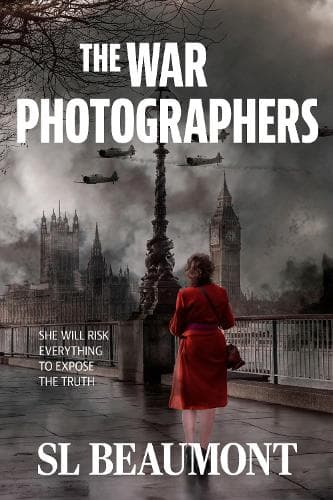Review — The War Photographers
Reviewed by Jessie Neilson
"It was almost like having regular house parties," Mae explains of her youth to granddaughter Rachel, "except we were being bombed".
When the novel opens, it is wartime in Europe. Mae Webster's proposed education at Cambridge has been interrupted. Instead, like many others, she finds herself right in the heart of the action, in her case, driving ambulances as bombs decimate London and its surrounds.
From minor aristocracy, Mae has enjoyed a privileged childhood in Chelsea under the guidance of various tutors and her stoic grandmother, Lady Alice. Alice approaches life with wit, and Mae inherits her intrepidness.
As a young woman keen to fly the coop, Mae desires direct participation in the war effort. Her previous plan to study languages now seems "frivolous". Knowing other languages, however, could be argued as vital at this time. No more so than for Mae and her colleagues, who are among thousands stationed in top-secret work at Bletchley Park.
To outsiders, Mae defines her new work as "just boring typing and stuff". In reality, she spends long hours in shift work behind black-out curtains, trying to decipher codes beneath green-shaded lightbulbs. Into this scene come brilliant minds, but any of these could be brimming with treachery, collaborating with Germans and Russians.
This work incorporates two main strands: one set in the middle of the 20th century and the other set in 1989. This historical, first-person narrative shares the stage with a modern, third-person one. It is now 1989, and the action is further along. Mae's granddaughter is a New Zealander, and she has grown up in North Otago where Mae now lives. However, like her grandmother, Rachel enjoys being in the midst of the action as a photojournalist. Moreover, 1989, with the state of the Iron Curtain, is a politically volatile year.
This modern strand criss-crosses between Aotearoa and hotspots of Europe. Like Mae before her, Rachel has a base in London. Like Mae, there are romantic attachments as well as overbearing, usurping males who interfere in what seems to be her intellectual destiny. Author S. L. Beaumont draws parallels between the two women's experiences decades apart.
Supporting — or sabotaging — these two storylines are a variety of secondary characters with their own political or personal agendas. The past comes to infatuate Rachel, as at the heart of Mae's story is a deeply personal crime from the Bletchley Park era: the death of Jack, Rachel's grandfather. Rachel is determined to track down the culprit and motive. However, Rachel's life is already complicated, even endangered, as she tries to record the turmoil around the Berlin Wall and neighbouring countries such as Hungary and Austria.
Beaumont has written thrillers and mysteries, and her novel Shadow of Doubt won the Indie Reader 2020 Mystery/Suspense/Thriller Award. She is based in Auckland and has previously worked in New York and London. Beaumont enjoys a travelling lifestyle, as do her characters in The War Photographers.
The historical backdrop of Bletchley Park and its remarkable team of codebreakers is fascinating. Beaumont spends sufficient time developing this setting, including the periphery characters. Mae's direct narrative brings the general sense of anxiety close to the reader.
Similarly, the Cold War era and its aftermath provide rich material that expands throughout the book's second half. At times, the reader feels far back from this action; however, the use of a first-person narrative could have been effective. Likewise, frequent date and place changes throughout interfere with a smooth reading experience.
Beaumont has dedicated this novel to "all the unsung heroes", focusing on women who are often behind the scenes. She has composed a fast-paced novel which spans years of excitement and anticipation as her main characters attempt to uncover the truth while under threat.
Reviewed by Jessie Neilson
